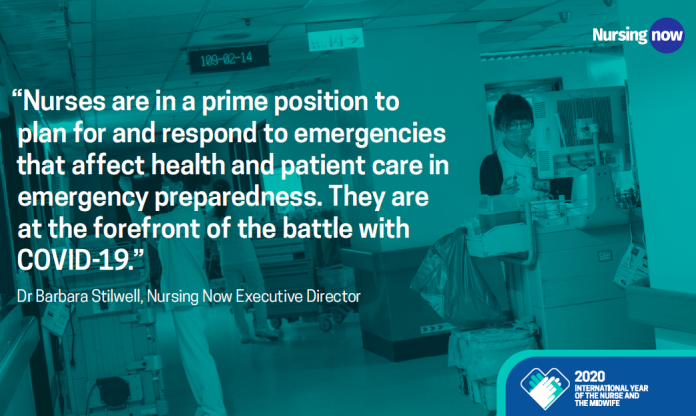
As the world continues to battle the COVID-19 crisis, nurses and midwives are on the frontline, working tirelessly to care for patients during this challenging time.
As a result of the Nightingale Challenge, more than 27,000 nurses and midwives from around the world have been enrolled in leadership development courses, created by their employers to show their commitment to the progression of their nursing and midwifery workforce. The onset of the COVID-19 crisis has meant that for many, their Nightingale Challenge journey has been put on hold, however now more than ever, developing strong leadership skills among nurses and midwives is essential.
We have highlighted below some of the key challenges being faced by Nightingale Challenge nurses and midwives, and detailed how some of the programmes have adapted since the onset of COVID-19.
You can find more information about each organisation’s response to COVID-19 on their individual Nightingale Challenge programme page.
See here for more information.
Increased anxiety and fatigue
Many nurses and midwives are reporting increased anxiety and fatigue as a result of working in this relentless COVID context.
In response to the increased anxiety and fatigue experienced by nurses and midwives, some Nightingale Challenge programmes are offering professional psychological support to ensure that their workforce is empowered and sustained to continue the battle against COVID-19.
In the face of the unknown, some Nightingale Challenge employers are providing leadership through their health care networks, providing positive messages and positive reinforcement to staff and creating increased upskilling and reskilling opportunities.
Social distancing regulations
While all in person, group meetings have been canceled, supporting and developing leadership skills within the nursing and midwifery workforce is paramount at this time. Encouraging mentorship is one way to maintain the relationship of learning and for many newly qualified nurses and midwives, the onset of COVID-19 will provide the opportunity to gain valuable leadership skills.
Marie Curie UK is offering its Nightingale Challenge nurses the opportunity to shadow pandemic meetings so that they experience how the organisation oversees the challenges and how the whole charity is focused on addressing the challenges to support them in their daily work. “This will enable them to observe strategic decision making and have the opportunity to influence some of these decisions,” explained Julie Pearce, Chief Nurse, Executive Director of Quality & Caring Services, Marie Curie, UK.
Many of the Nightingale Challenge programmes are now offering distance learning courses, virtual coaching from identified mentors, as well as sharing online motivational messages in support of their nurses and midwives. In countries where the internet is unreliable, voice messages and videos are shared via phones of the participants to support and promote learning.
Some Nightingale Challenge programmes have established online resource sharing platforms which also allow nurses and midwives to share messages and discuss issues at hand. The European Oncology Nursing Society has developed a network of Young Cancer Nurses which members can tap into for peer support and informal debriefings.
Providing palliative care
Palliative care is undergoing huge changes at this time and nurses are having to adapt quickly to new guidelines and processes, sometimes on a daily basis. Palliative care is a key discipline for end of life care in COVID-19 and it is crucial that nurses working in this field are given additional guidance to best support patients and their families. “Delivering palliative care whilst wearing personal protective equipment affects some of the key non-verbal communication skills – a smile goes a long way but when wearing a mask we are having to ensure our verbal communication is key,” said Julie Pearce, Chief Nurse, Executive Director of Quality & Caring Services, Marie Curie, UK.


